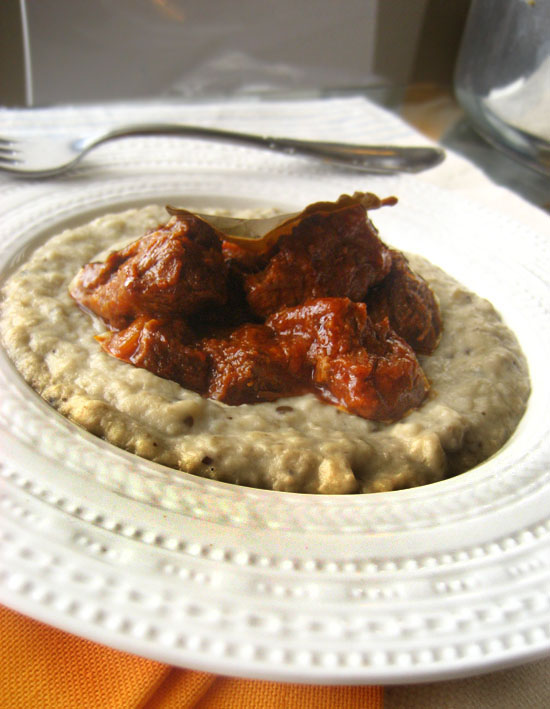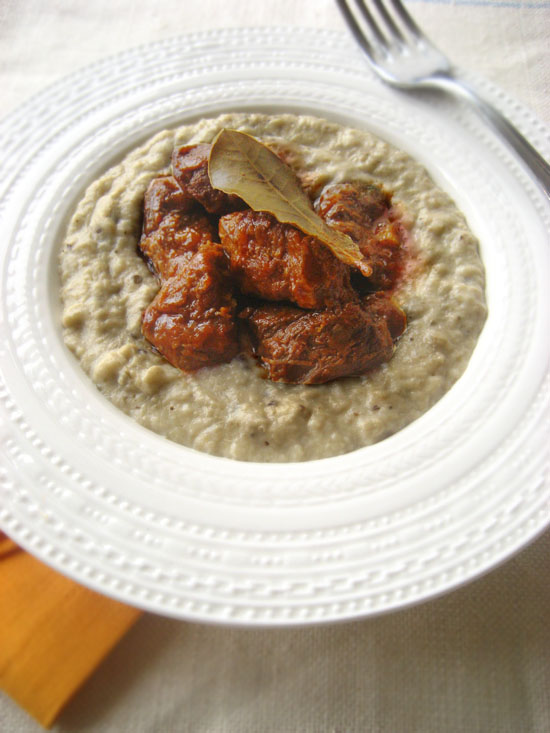Another Cook the Books, our bi-monthly reading and cooking club I am hosting together with Rachel and Deb has come to an end. Rachel thought it would be a good idea to read something about Greece, so I chose Harlot’s Sauce by Patricia V. Davis. The book is Patricia’s memoir and centres around her marriage to a Greek-American, Gregori, her moving to Greece, and the difficulties both of them brought to her life.
Harlot’s Sauce was for me at least, a painful read. First of all Gregori’s type of a man, the chauvinistic, ignorant, pseudo-alpha male makes my stomach turn. Many times while reading the book I just wanted to scream: just divorce the bastard. Or poison him with a fola (poisoned meat used to kill stray animals in Greece). Seriously, I really don’t understand how she managed 15 years of marriage to this guy. What a saint!
Then it was all the descriptions about what Greeks are like. Until about page 200 (out of 264)I actually thought that Patricia didn’t like us (Greeks) at all. And what was there to like from Gregori and his relatives, who represent the close-minded, backward thinking, which has brought our country to the terrible state it is today? But then Patricia moves to Greece, meets many interesting people, matures and develops as a personality and the tone of the book lightens a little. Perhaps because she also sets up a business and finally starts respecting herself. Or because Greece is (or was) actually a nice place to live, albeit totally hectic and disorganized.
Like the heroes of the book who are mixed up about the national identity , the recipe I chose for this post is Turkish at heart, but was very often part of the cooking repertoire in Greek families who lived in Istanbul during the late 19th and early 20th century. The Greek community of the Ottoman Empire (and later Turkey) felt truly Greek, but when they were forced to move to Greece due to political turmoil in the 20’s and later in the 60’s they were considered foreign, strange and were often frowned upon. Their cuisine, like their vocabulary, is a mix of ottoman, turkish and greek elements, which makes it truly spectacular. Most of the dishes are opulent and labour intensive and sometimes feel totally inappropriate for today’s hectic lifestyle.
Another reason I chose this recipe is because it is basically a deconstructed version of moussaka, the Greek emblematic dish, which features rather negatively in the book, because Gregori’s mother Demetra prepares it for Patricia’s parents disregarding their dislike towards cheese. I was a bit baffled by this, because the use of cheese in the moussaka is optional and could have easily been left out. I guess Demetra REALLY wanted to get her way…
Hünkar Beğendi can be translated as «the emperors finest» and refers mainly to the puree and not necessarily to the whole dish itself. Marianna Gerasimou in her book Ottoman Cooking (in Greek) states that it was first made in the palace kitchen to celebrate empress Eugenia’s visit in 1869, but there are no written sources to verify this.
In any case the dish is very tasty, but to get the smoked taste you have to char the aubergines either over open flame or at the BBQ (always whole). I resorted to an easier method: I used SAVU smoker bags. I am sure there are other brands you can use of course, but I was given those bags a while ago and hadn’t used them. I have to say that the result was good, not so authentic, as the smokiness they impart is very different from the one you get from charring the aubergines, but we really enjoyed the dish.
The recipe for the aubergine puree does not contain any cheese in it, but you can add some if you like, although Gerasimou advices against it.
If you enjoy cooking and reading, why don’t you join us for the next round of Cook the Books? We will be reading Outlaw Cook, a book of food essays by John and Matt Lewis Thorne, hosted by Rachel.
Beef stew with tomato sauce and smoked aubergine (eggplant) puree
INGREDIENTS for 6 people
for the meat
- 1.5 kg stewing beef (or lamb), cut into small cubes
- 3 large onions, finely chopped
- 200ml tomato passata
- 1 tbsp tomato paste diluted in some water
- 1/2 glass of red or white wine
- 1 bay leaf, 2-3 allspice berries, 2 cloves, 1/4 tsp cinnamon
- salt, pepper, olive oil
for the aubergine puree (recipe by Marianna Gerasimou)
- 1 kg aubergines, baked whole in the oven until charred, or cooked in a smoker bag
- 135g all purpose flour
- 90g butter
- 500ml milk, preferably warm
- salt
- a handful for grated cheese (optional)
DIRECTIONS
- To make the stew: wash the meat thoroughly and pat dry with kitchen paper.
- In a large pot heat 6-7 tbsp of olive oil and gently brown the pieces from all sides, about 20 minutes. You have to do it in batches and not crowd the pot. Set the meat aside.
- Add the chopped onions to the pot and let them soften. Pour in the wine, wait until it has evaporated a bit and then add the meat, tomatoes, and spices and simmer everything very gently until the sauce is thick and the meat is tender and falling off the bone. I used a pressure cooker to save time (it takes 1 hr instead of three). Season well. You can prepare the stew a day in advance if you like, although I usually don’t like stews with tomato sauce the next day.
- Prepare the aubergines. Grill the aubergines skin on, from all sides, until the skin has charred and the flesh is soft, about 30 minutes. If you use a Savu bag, just slice the aubergines, sprinkle with a bit of salt and bake in the oven following the instructions, until soft, about 45 minutes. If you decide to bake the aubergines in the oven (skin on always)
- Place the whole aubergines in a bowl with cold water and peel the skin. Remove seeds and squeeze the flesh to remove all water. If you bake in a Savu bag, just remove the skin from the slices with your hands. Chop finely. If you decide to bake the aubergines whole in the oven, you could also season the puree with a few drops of liquid smoke to get that smokey taste.
- In a large pot melt the butter and add the flour. Cook the flour with the butter over medium heat for 2-3 minutes, then add the (preferably warm) milk slowly, until the mixture thickens. It is basically a bechamel sauce.
- Add the aubergine flesh to the bechamel mixture and stir well to incorporate it. I also used my immersion blender to ensure that everything is nice a mushy. Add the cheese if you are using. You can make the puree one day in advance. Cover tightly with cling film and place in the fridge until needed.
- To serve: place two-3 tbsp of aubergine puree on each plate, make a small well in the centre and add some meat with sauce. Serve hot.


Your dish looks delicious! I confess that I found the book an odd choice for a Greek! The positive references to Greek pension conditions and salaries were also very painful given the current economic situation.
WHat a coincidence- I made Hunkar Begensi again last night – a dish I adore! I’m glad you gave the Ottoman background on the dish and relating the story of the Constantinople Greeks. They came to Greece with just their cultural baggage and we’re all richer for it!
I have read and reread your book commentary above and really appreciate your insights. This was probably the least «foodie» of the books we’ve read for Cook the Books but I was nonetheless interested in what the author learned about Greek culture. It just seemed that she picked the wrong guy, with a chorus of unbending family members, to be her introduction to all the wonderful things about Greece. Your dish also looks really wonderful.;)
I think I am in love with your dish–that smoked aubergine is amazing. I think cheese would be overkill. 😉
An interesting read and absorbing too. I can only imagine what reading this book must have been like for you.
Αν και αυτή την εποχή «κόβω» τις μελιτζάνες, το φαγάκι σου με βάζει σε πειρασμό! Καλομαγειρεμένο!
Το χουνκιάρ είναι αγαπημένο μου πιάτο και το δοκιμάζω όπου το βρω! Αλλά έχει πρωταγωνιστήσει και σε πολίτικη βραδιά με φίλους!
Η μητέρα μου ήρθε από την Κωνσταντινούπολη σε πολύ μικρή ηλικία με τον διωγμό και ξέρω ακριβώς τί σημαίνει να είσαι Έλληνας από την Πόλη.
Πολύ ωραία το έφτιαξες Ιωάννα το χουνκιάρ! Με αυτά τα φαγητά έχω μεγαλώσει!
Πολύ χαίρομαι που την «εγκρίνεις» τη συνταγή! Έγινε σούπερ φαγάκι κυρίως γιατί βρήκα μελιτζάνες χωρίς σπόρια.
Thank you so much for posting this commentary about Harlot’s Sauce and this absolutely fabulous recipe which I made last night. I never apologize for my work nor am I offended when someone doesn’t like it. Quite the opposite, I like to learn from criticisms and always truly appreciate anyone who takes the time and spends the money, especially in these times, to read my work. However, i must say I am dreadfully sorry you got the impression that I don’t like Greeks. I loved Greece and only had problems with a certain particular Greek. And you know what? His type exists in many cultures. It wasn’t because he was Greek that he was the way he was. I believe I pointed that out. As for being a «saint» nope– I was an insecure girl, terribly afraid to make waves with a divorce. That fear for many women is sometimes so great that we will tolerate physical and emotional abuse. My time in Greece helped me overcome that.
I am glad you liked the recipe and I am sorry you got the impression I didn’t like the book. I actually didn’t ENJOY it, which is different. And the reason I didn’t enjoy it is because it is so TRUE. Your remarks about the Greeks, men, Greek mothers, everything. Not everyone is like that in Greece but frankly Gregori is a common type, especially in the province. And because I don’t really like Greek men, I chose someone with a mixed background (Finnish-Greek) who would be my partner and not my owner. Finally, don’t forget that in Greece we are under a lot of pressure lately, socially, politically and financially, so perhaps I needed a lighter read.
Beautiful stew! I love the smoked aubergine and definitely want to try this myself!
I am intrigued by the aubergine puree as well: I love aubergine. You bring up an interesting point: our reaction to a book depends, among other factors, on what is going on not only in our life but also in our society when we read it. I hope brighter days are ahead for both Greece and Italy.
Ωραία συνταγή! Πέτυχα το blog σου τυχαία σήμερα και έχω ενθουσιαστεί… Έχουμε την ίδια βιβλιογραφία : )) Κοχιλά, Κρεμέζη, Γεράσιμου… μήπως διαβάζεις και Αndrea Camilleri ή Manuel Vazquez Montalban;
This recipe looks divine!